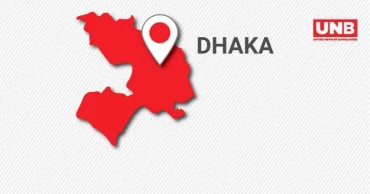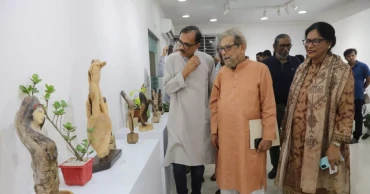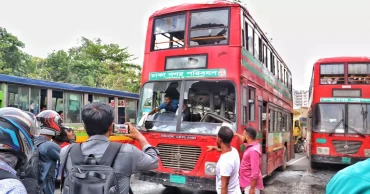Dhanmondi
Woman sentenced to death for Dhanmondi double murder
A Dhaka court on Tuesday convicted a woman and sentenced her to death in a case filed in connection with the Dhanmondi double murder in 2019.
Judge of Dhaka Additional Metropolitan and Session Judge Court-7, Tauhida Akter handed down the punishment.
The convict is Surovi Akter, domestic help of deceased Afroza Begum.
The court also fined her Tk 50,000, in default to suffer five-months more in rigorous imprisonment.
Youth’s body recovered from Dhanmondi Lake
The court also acquitted Bachhu Mia, a worker of the house, as allegations brought against him could not be proved.
According to the prosecution, police recovered the bodies of Afroza Begum, 65 and her housemaid Diti, 18 from a house at Lobelia House in Dhanmondi area of the capital on November 1, 2019.
A case was filed with Dhanmondi Police Station on November 3, 2019.
Police submitted chargesheet against Surovi and Bachhu Mia on February 1, 2022.
14 days ago
'BNP agent’: Quader calls TIB
Awami League General Secretary and Road Transport and Bridges Minister Obaidul Quader today (January 18, 2024) said that the report of Transparency International Bangladesh (TIB) is “one-sided and anti-government.”
“They (TIB) are agents of BNP,” he said at a press briefing at the Awami League president’s office in Dhaka’s Dhanmondi this afternoon.
“TIB speaks in the tune of BNP. History says that they were always against Awami League. They speak for BNP. We could not find impartiality of their research,” said the AL leader.
“There are some organisations that talk about accidents. If a hundred die, they say five hundred died. TIB is like them. TIB and CPD said Padma Bridge is impossible. Filing a case doesn’t solve everything. Some are said for public perception. They will be dealt with politically,” he said.
Read more: Top 5% contractors account for 26% market share in government procurement: TIB
TIB in its report on Wednesday said Bangladesh’s 12th parliamentary election was “not free and not inclusive.”
Quader acknowledged the existence of political tactics and conflicts within parties, asserting, “Conflicts are inherent in politics, and Awami League navigates through them under the leadership of Sheikh Hasina. The party remains united in addressing challenges wherever they arise.”
Addressing upcoming local government elections, Quader said, “Decisions regarding local government elections, including upazilas, and the use of party symbols will be finalized in the Awami League board meeting.”
When asked who would be the opposition party in the parliament, Quader responded, “Clarity on the opposition party will emerge once the session commences.”
Regarding commodity prices, Quader noted, “Sheikh Hasina has provided instructions on commodity prices. Ministries are formulating action plans based on the ground reality, including price control measures.”
Read more: Even if action can’t be taken now, strong measures will be taken after election: Quader on those whose wealth saw abnormal increase
The press briefing was attended by AL Organizing Secretary BM Mozammel Haque, SM Kamal Hossain, Sujit Roy Nandi, among other leaders.
2 years ago
Police rescue tortured female homemaker after getting call from 999
Police rescued a tortured female homemaker from Road No. 11 of Dhanmondi area on Tuesday after getting a call from the national emergency helpline 999.
“Please save me, they will kill me. Please take me out from here,” the girl said to the police over the phone.
Derailment halts rail link between northern districts with Dhaka, southern region
A press release signed by Anwar Sattar, Inspector of Police and Media and Public Relations Officer of National emergency service 999, revealed the matter on Wednesday.
The call was received by 999 call taker Constable Manzoor Rashid. He immediately informed Dhanmondi Police Station to take immediate action to recover the girl.
Bus set on fire in Dhaka’s Jatrabari ahead of 48-hr countrywide blockade
On receiving the information, a team of Dhanmondi Police Station rushed to the spot and rescued a 20-year-old female homemaker named Sumi.
Later, the girl was handed over to the custody of her parents. The rescued girl and her parents were reluctant to take further legal action or file a written complaint.
Derailment: Dhaka, southern regions’ train link with north resumed after 6 hrs
ASI Shamsuzzaman, who led the police team of Dhanmondi Police Station, confirmed the matter.
2 years ago
BNP leader Annie picked up by police, party says
BNP’s Publicity Secretary Shahid Uddin Chowdhury Annie was picked up by police from his Dhanmondi residence in Dhaka early today (October 11, 2023).
Police arrived at the house of Annie around 2 am and asked the BNP leader to go with them to the police station, said Zahir Uddin Swapan, chief coordinator of BNP's media cell.
Over 5,000 including BNP leader Annie sued in 4 cases over clash with police in Lakshmipur
The reason behind the detention could not be known immediately.
BNP’s Salam, Annie freed from jail
2 years ago
Driftwood art exhibition by sculptor AA Rasha inaugurated in Dhaka's Dhanmondi
A weeklong solo exhibition of driftwood artworks of sculptor Akhtar Ahmed Rasha highlighting Bangladesh’s Liberation War, women’s empowerment, and nature began at Safiuddin Shilpalay in Dhaka's Dhanmondi on Thursday.
Cultural personality and lawmaker Asaduzzaman Noor inaugurated the exhibition organised by Studio Vertical, according to a press release.
Read : ‘The Reflection of Endless Mystery’: Nabaraj Roy's first solo exhibition opens at AFD
The exhibition titled "Drifting to the Root, Drifting to Love" is the first exhibition in the country by Rasha, an expatriate sculptor who employs natural materials like branches, roots, and trunks to craft found object art.
He earlier joined a number of solo and group exhibitions in New Jersey, New York, and Washington, DC, the US, said the release.
Read : BSA commemorates August 21 with photography and public art exhibition
"I’ve tried to give expression to my experience of life in Bangladesh, and the process started with scavenging driftwood on beaches along the Atlantic coast. I am happy that I’ve focused on the Liberation War, especially for friends of Bangladesh abroad," said the artist.
As many as 53 artworks have been put on display at the exhibition, which will remain open to the public between 11:00 am and 7:00 pm every day until September 13.
Read : Atia Islam Anne’s third solo exhibition ‘Contemporary Narratives’ opens at AFD
Art collector Abul Khair Litu, among others, addressed the inaugural ceremony chaired by Professor Nisar Hossain, dean at the Faculty of Fine Arts, Dhaka University.
2 years ago
Police, BNP clash in Dhaka’s Dhanmondi; One vehicle torched
A chase and counter-chase took place between police and BNP leaders and activists in front of City College the capital's Dhanmondi area on Tuesday (May 23, 2023).
Witnesses said leaders and activists of BNP staged a prescheduled march programme in the Dhanmondi area in the afternoon to press home their 10-point demand, including holding the next general election under a non-party caretaker government..
After the end of the march, they brought out a procession that ended at the Science Lab intersection.
When they were marching towards City College, a chase and counter-chase took place with police around 4 pm, triggering a clash.
Read more: Law enforcers cordon off Rajshahi BNP office, March programme cancelled
Later, police lobbed tear gas shells and charged batons to disperse the BNP men.
The BNP activists also hurled brick chips targeting police, said Deputy Commissioner of Ramna division of DMP Md Ashraf Hossain.
Several vehicles were vandalized and one was set on fire during the clash.
“Police took the situation under control and arrested some people from the spot,” said DC Ashraf.
Read more: Mirza Fakhrul, Rajshahi BNP leader sued for 'death threat against PM'
Ashraf said a group of BNP leaders and workers attacked the police and obstructed the movement of vehicles, forcing the law enforcers to go into action.
He said 8/9 police personnel were injured in the attack. "We have arrested 15 people in this connection.”
Dhaka South City unit BNP convener Abdus Salam said they ended their road march peacefully near LabAid and asked their leaders and workers to go to their respective destinations.
“But police attacked our leaders and activists when they were returning home, leaving many of the injured. They also attacked our some leaders and activists, including Dhanmondi unit president Robiul Islam Robi,” he said.
Read more: AL files two cases against 450 BNP men over a clash in Patuakhali
Salam strongly condemned this incident and demanded the release of the arrested leaders and activists immediately.
2 years ago
The ecosystem engineers that can filter Dhanmondi Lake’s water within 21 hours
What if someone told you that the entire water of Dhanmondi Lake can be filtered within 21 hours? That too through freshwater mussels?
You read right. What many may not be aware of is that mussels act as super-filters – each mussel can filter between 10 and 20 gallons (37.85-75.7 litres) of water every day.
Remarkable information on the humble mussel’s key role in improving water quality and aquatic environments came about during a conversation with Dr David C Aldridge and Dr Gawsia Wahidunnessa Chowdhury.
Dr David C Aldridge, a Professor at Cambridge University’s Department of Zoology, whose work focuses on applied freshwater ecology with a particular emphasis on bivalve molluscs (mussels, oysters, clams), was in Dhaka recently.
While in Dhaka, Dr Aldridge gave a presentation at the Department of Zoology of Dhaka University. He also guided a group of MS and MPhil students of DU’s Department of Zoology who will be working in the field over the next 1-2 years.
His work has attracted a number of awards, including the World Bank’s Development Award (2006) for sustainable improvement of water quality in developing countries and the Entec Medal (2007) for contributions towards environmental protection.
Dr Chowdhury is a Professor of zoology at the University of Dhaka, who obtained her PhD in Zoology (wetland ecology) from the University of Cambridge. A Commonwealth Academic Staff Scholarship and a Wildlife Conservation Society Fellowship are just two of the several honours and scholarships she has received. She works with government, non-government and international organizations. She is a board member of the international conservation organization WildTeam.
Her work focuses on conservation of aquatic ecosystems and threatened species in Bangladesh.
While talking at WildTeam’s office at Cosmos Centre in Dhaka, Dr Aldridge and Dr Chowdhury elaborated about their work in Bangladesh.
Read more: Many waterways abandoned due to irregularities in dredging
Talking about his research in China, Dr Aldridge said, “We worked on declining water quality, comparable to that in Bangladesh. A lot of the lakes, both in Bangladesh and China, suffer from heavy nutrient enrichment – driving algae abundance in the water and a decline in biodiversity.”
“My work in China with the World Bank was very much about using natural filter features to remove the algae in some of the lakes and restore the systems towards a cleaner water status. And the work was incredibly successful. We actually managed to clear the water in some lakes using native freshwater mussels that are really important filter feeders,” he went on.
“The results were so effective and the water became so clear that plants started to grow on the banks of the lakes that hadn’t been seen for over 30 years. These plants then created a habitat for native invertebrate, and that was better food for fish.
“One of the things we’re trying to do in Bangladesh is to develop a similar approach where we encourage important ecosystem engineers like freshwater mussels that can help in developing better quality habitats for all sorts of other aquatic life,” Dr Aldridge said.
Referring to their work in Dhaka, he said, “Dr Chowdhury did some very important work for her PhD, looking at the roles that the native freshwater mussels could play in supporting biodiversity in Dhanmondi Lake, which is one of the larger lakes in Dhaka.”
“We’re very interested in looking at whether we can encourage freshwater mussels to restore the degraded water quality, to make better quality ecosystems. And we also want to combine that with growing pearls in the freshwater mussels so that local people get an enhanced livelihood,” he added.
With an additional source of income, degraded waterbodies can be restored and everyone wins, Dr Aldridge and Dr Chowdhury were of the opinion.
Talking about her PhD project, Dr Chowdhury said, “During the dry season, we looked at the function of mussels in the Dhanmondi Lake nearshore zone. Mussels were abundant when 50 locations, between one and three metres from the shore, were sampled. According to our calculations, mussels can filter the lake’s water in just 21 hours. And it is done by two species of freshwater mussels.”
Not all lakes and waterbodies in Dhaka are in as promising condition as Dhanmondi Lake, however, according to the researchers.
They visited several lakes and rivers in and around Dhaka and observed that the mussel populations are perhaps declining.
Some lakes in Dhaka have no mussels at all. The water is too polluted, and that is cause for concern, they said.
Regarding the prospect of encouraging freshwater mussel population growth to restore degraded water quality and combining that with pearl farming, the duo visited Bangladesh Fisheries Research Institute (BFRI) facilities that play a significant role in cultured pearl.
“We met the BFRI DG, and visited their farm. We’re hoping to set up a collaboration between BFRI and my research group at Cambridge University as well as Dr Chowdhury’s team, so that we can help to collectively develop this project,” Dr Aldridge said.
There are, however, challenges that pose threats to the aquatic “super filters”.
According to Dr Aldridge and Dr Chowdhury: Freshwater mussels are very important in ecosystems because as filter feeders, they remove algae from the water that helps to push freshwater ecosystems away from low oxygen, low biodiversity state. But this also relies on freshwater mussels being healthy and being able to live in those ecosystems.
In Bangladesh’s southwest coastal region, increased salinity of waterbodies – linked to climate change – might interact with their ecosystem engineering functions. The more stressed mussels are, the less effective they are going to be as ecosystem engineers. This also affects the mussel population.
How adaptable the mussels might be will be a decisive factor in this regard. If the rate of change in salinity in the rivers is quite modest, the mussels can adapt and respond. If there are sudden changes, then the mussels may not be able to survive, resulting in a collapse in the ecosystem services.
2 years ago
Mujibnagar Day: PM pays tribute to Bangabandhu
Prime minister Sheikh Hasina today paid tribute to Father of the Nation Bangabandhu Sheikh Mujibur Rahman on the occasion of the historic Mujibnagar Day.
She paid homage by placing a wreath at Bangabandhu’s portrait in front of Bangabandhu Memorial Museum in Dhanmondi, Dhaka this morning.
After laying the wreath, the prime minister stood in solemn silence for some time as a mark of profound respect to the memory of Bangabandhu, the architect of independence.
Flanked by central leaders of Awami League, Sheikh Hasina, also the president of the party, placed another wreath at the portrait of Bangabandhu on behalf of AL.
On this day in 1971, Bangladesh’s first government in exile was formed at the Baidyanathtala mango orchard in Meherpur, under the then Kushtia district.
The place was later renamed Mujibnagar as a tribute to Bangabandhu who had been declared as the president of the government-in-exile.
Syed Nazrul Islam was appointed the acting president in the absence of Bangabandhu. Tajuddin Ahmad was appointed the first prime minister, while captain M Mansur Ali and AHM Quamaruzzaman were made cabinet members.
The successful leadership of the core cabinet steered the Liberation War to victory on December 16 that year.
2 years ago
Brazilian Ambassador visits "Cafe Sao Paulo" at Dhanmondi
To introduce Bangladshi people with the different cuisines of the world and introduce them with coffee culture, the Model Group has started the journey of "Cafe Sao Paulo" at Dhanmondi.
The Cafe is named after the famous Brazilian city, Sao Paulo.
Ambassador of Brazil to Bangladesh João Tabajara de Oliveira Junior visited the Cafe Sao Paulo, said a media release on Saturday.
Also read: Ensuring "smooth and inclusive" graduation is key to Bangladesh: Ambassador Danzi
4 years ago
DPDC blames delay in launching Dhanmondi underground cable project on DSCC, hails DNCC cooperation
Despite huge efforts Dhaka Power Distribution Company (DPDC) has failed to start physical work on taking overhead cables underground in the Dhanmondi area as planned with the utility officials blaming it on the Dhaka South City Corporation (DSCC).
“We had full preparation to start the job in September last as per plan. But we did not receive permission from DSCC to dig the streets to lay our cables and install other equipment”, said a top official of the DPDC.
He, however, said they have been receiving good cooperation from the Dhaka North City Corporation (DNCC) to replace the overhead cable with underground one.
"That's why we have been able to implement another similar project from the city’s Jahangir Gate in Cantonment to Bangabhaban, the presidential palace”, he said adding that cables were already laid from Jahangir Gate to Farmgate area.
According to official sources, the DPDC had undertaken a huge project of Tk20,500 crore, funded by China, to take its overhead electricity lines underground as part of a mega plan to ensure an uninterrupted, safe, secured electricity supply to its part in Dhaka city.
“Making the views beautiful by removing the ugly and hazardous cables is another main objective of the project”, said Bikash Dewan, managing director of the DPDC.
He also said the overhead cables from Jahangir Gate to Bangabhaban via Karwan Bazar-Kakrail-Fakirapool-Dainik Bangla crossing will disappear once the project is completed.
He appreciated DNCC for cooperation to implement this project as other utilities like internet and TV cable operators have showed positive attitudes to join the project.
About the failure to start the job in Dhanmondi area in September, Bikash said he is hopeful of settling some issues with DSCC to convince it to give the nod to dig the streets and start the physical work of the project.
READ: Much-hyped work on underground cabling in Dhanmondi set to start in Sept
“I think, during next few meetings we would be able to settle the issue with the DSCC”, he told UNB.
At present, a number of utility bodies including Desco, DPDC, cable TV operators and internet service providers (ISPs) and state-owned land phone operator BDCL use overhead cables to reach their services to consumers.
All these utilities hang their respective cables in the same poles used by the electricity supply company which creates an eyesore and carries a risk of accidents, including fire.
“Indiscriminate network of such cables not only undermines the beauty of the city, but it also poses a big threat of accidents including catching of fire”, said a city resident.
The DPDC officials said their mega scheme also includes setting up 40 substations in the city and moving overhead cables of Hatirjheel Lake underground. Taking overhead cables underground from Jahangir gate in Cantonment to Motijheel is also included in DPDC’s other similar project.
Earlier, DPDC completed its design and plan to implement its proposed underground cabling project to make the city free from overhead power cables.
“Already, some of the equipment reached the country and some are on the way,” he said, adding that pole-mounted transformers will be replaced with box-type transformers under the project.
READ: Desco’s underground cabling plan misses JICA deadline for its own fault
Some 36 box-type transformers, 296 of 6-way ring main units (RMU), 34 of 3-way RMUs and 130 LV Cabinet will be installed to facilitate the underground cabling system, Bikash said.
DPDC officials said the project was supposed to kick off in January 2020. But the Chinese engineers who were responsible for designing the works got stuck in their hometown Wuhan following the outbreak of Covid-19 pandemic.
4 years ago


















